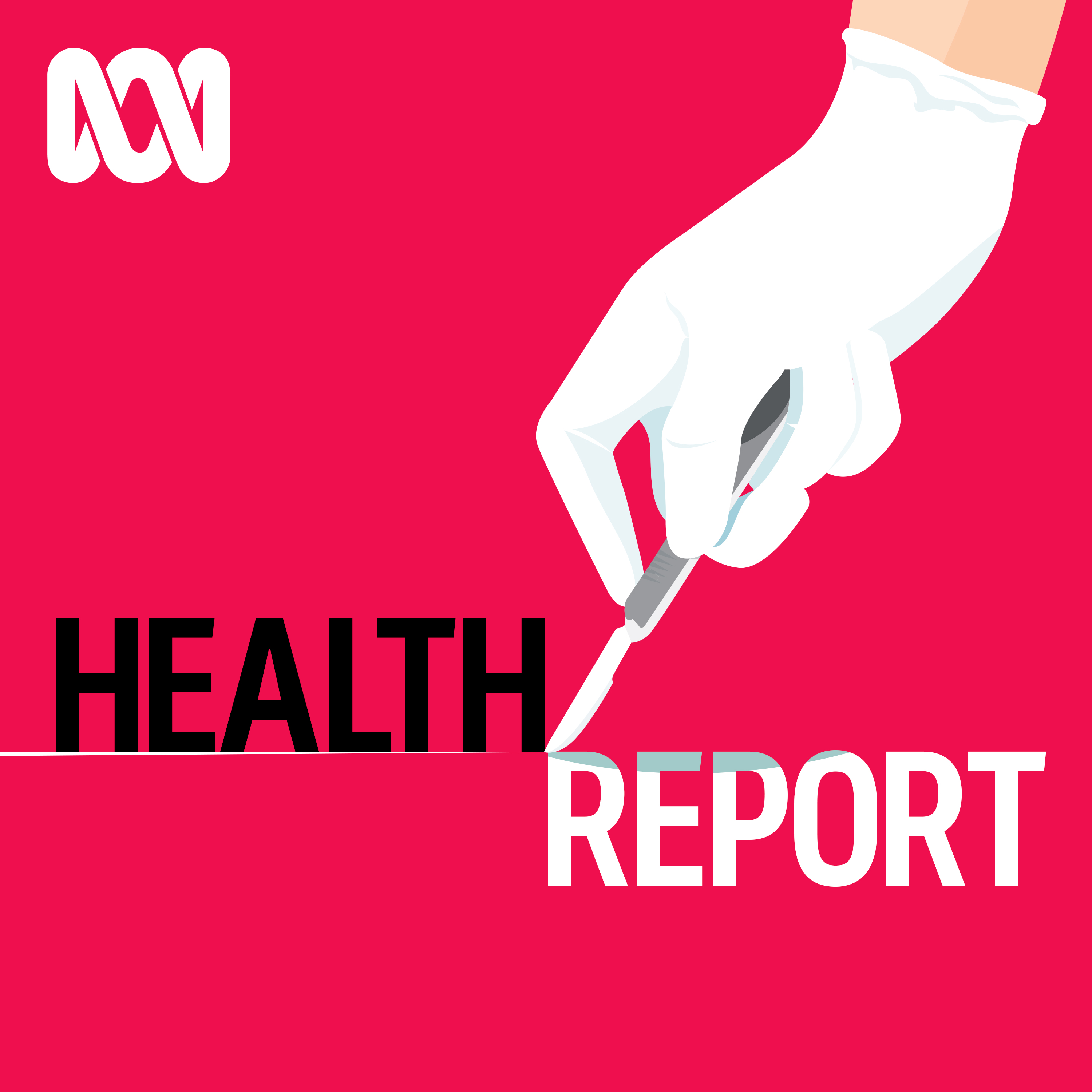

Health Report - Separate stories podcast
ABC
Covering the health stories that make a difference. Dr Norman Swan and Dr Preeya Alexander dissect the latest and breaking news in the medical world.
Episodes
Mentioned books

Oct 24, 2025 • 3min
Mailbag: Pathology results
A look at some of the Health Report correspondence this week.You can email us at healthreport@abc.net.au

Oct 17, 2025 • 9min
Why we should pay attention to antibiotic resistance
The World Health Organization (WHO) has put out its global report on antibiotic resistance.In some countries resistance to last-ditch antibiotics is going up, leaving no treatment options available to potentially deadly bugs. Also, if you've got a My Health Record you'll be getting faster access to some blood test results. ReferencesGlobal antibiotic resistance surveillance report – World Health Organization New test categories available for faster access on My Health Record

Oct 17, 2025 • 7min
What is rosacea and how is it treated?
Rosacea is a common and chronic skin condition that often affects the cheeks, chin, nose and eyes.While there’s no cure, there are treatments that can help manage the condition.There are people who are more susceptible, and some potential risks that go alongside it.Guest/sAssociate Professor Gayle Ross, dermatologist and the head of dermatology research at Royal Melbourne Hospital

Oct 17, 2025 • 0sec
Human gene editing: what's possible vs what's ethical
In 2018, Chinese scientist He Jiankui announced he had edited the genomes of human embryos.The births of twins Lulu and Nana brought forward an ongoing debate about whether we should ever make heritable changes to the human genome.And if we do, how far should we go? Can we really stop at curing disease, or will we be opening the door for designer babies?Guest/sProfessor John Rasko, leading researcher in gene therapyProfessor Matthew Porteus, paediatrics and stem cell biology at Stanford UniversityDistinguished Professor Emerita Dianne Nicol, Centre for Law and Genetics at the University of TasmaniaThank you to the Children's Hospital of Philadelphia for supplying the baby KJ audio, and Genepool Productions for supplying the citizen's jury audio used in this episode.

Oct 17, 2025 • 2min
Mailbag: Diet for endometriosis
A look at some of the Health Report correspondence this week.You can email us at healthreport@abc.net.au

Oct 10, 2025 • 12min
More than 54,000 children in Gaza acutely malnourished
Tens of thousands of children aged under five are suffering acute malnutrition in Gaza, according to a recent study highlighting the impact of blockades and aid restrictions. The study published in the Lancet shows how rates of wasting — measuring the circumference of the upper arm — noticeably fluctuated when aid was allowed through or at times of ceasefire. ReferencesAssessment of malnutrition in preschool-aged children by mid-upper arm circumference in the Gaza Strip (January, 2024–August, 2025): a longitudinal, cross-sectional, surveillance studyTestimony, advocacy, and the public health effect of genocideHealth of the Nation report - RACGPNobel Prize in Physiology or Medicine

Oct 10, 2025 • 11min
Can diet changes help in endometriosis?
There is emerging evidence that diet changes might be able to help people with endometriosis manage their symptoms.There have been recent studies looking into the effects of a low FODMAP diet and supplements.Guidelines have been updated to reflect where the evidence stands on endometriosis care and treatment.Guest/sDr Marilla Druitt, obstetrician, gynaecologist and RANZCOG councillorReferencesAustralian Living Evidence Guideline: Endometriosis - The Royal Australian and New Zealand College of Obstetricians and Gynaecologists

Oct 10, 2025 • 8min
Rethinking heart failure prevention
Heart failure affects about 55 million people worldwide, including Almost 144,000 people in Australia.Prevention is possible, but are we taking the right approach to lower the risk of people falling into heart failure?A new Lancet series propose a comprehensive framework to reduce the burden of heart failure in the community.Guest/sAssociate Professor Adam Nelson, cardiologist at the Royal Adelaide and Queen Elizabeth hospitalsReferencesCardiovascular, kidney, and metabolic health: an actionable vision for heart failure prevention - the Lancet

Oct 10, 2025 • 6min
Challenging the stigma of anal cancer
Anal cancer is a rare cancer with a lot of stigma attached, and many misconceptions.While rates are significantly higher in men who have sex with men than those who don’t, more women are still diagnosed with the condition than men.We also know most cases are caused by infection with specific strains of human papillomavirus (HPV), driving home the importance of vaccination.Guest/sDr Mary Poynten, clinical epidemiologist and Group Leader of the Anal Cancer Prevention Research Group at the Kirby Institute at the UNSWReferencesAnal Cancer Screening Guidelines

Oct 10, 2025 • 5min
Mailbag: Eating disorders and GLP-1 access
A look at some of the Health Report correspondence this week.You can email us at healthreport@abc.net.au


